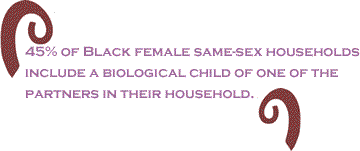With
October being �Coming Out� Month I thought I re-introduce
a subgroup in our LGBTQ community that is too often forgotten
and/or ignored-lesbians, bisexual and transgender (LBT)
women of African descent.
I
want to re-introduce this group because a groundbreaking
study in July came out titled �Black Lesbians Matter�
examining the unique experiences, perspectives, and priorities
of the Black LBT community, and sadly little is known
about it.
 This
report by the Zuna
Institute reveals that LBT
women of African descent are among the most vulnerable
in our society and need advocacy in the areas of financial
security, healthcare, access to education, and marriage
equality.
This
report by the Zuna
Institute reveals that LBT
women of African descent are among the most vulnerable
in our society and need advocacy in the areas of financial
security, healthcare, access to education, and marriage
equality.
The study
is akin to a census conducted over several months in 2009
� 2010 where 1,596 LBT women from regional,
statewide, and local organizations in New York, Atlanta,
Chicago, and Denver, and also through an on-line survey
participated. The study focused on five key areas:
health, family/parenting, identity, aging, and invisibility.
Key
findings of the survey revealed the following:
It's
clear the survey brings to the forefront information from
a traditionally marginalized group, highlighting the needs
and concerns defined by the community. But Zuna is the
first to gather the data on us.
Although
Zuna Institute has been around since 1999, people still
ask who are they?
In
the inimitable way that black women�s kitchens function
as �think tanks� on social justice and civil rights
issues, birthing numerous organizations, is also how Zuna
Institute was founded. Zuna is the first of its
kind in becoming a national organization providing services
to the Black LBT community. Believing that the development
of a healthy Black LBT identity, can only come about by
advocating specifically for LBT of African descent on
a national level, and it would effectively eliminate the
stigma and the barriers of race, class, gender and sexual
orientation discrimination we face daily, Zuna aims at
bettering our quality of life by holding national conferences
providing relational/social, and educational resources
to use for healthcare, political and economic advocacy.

Since
the decade of the 1970�s there has been nearly a twenty
year hiatus since the country has seen collective black
LBT activism on a national level.
However,
back in the 1970�s LBT women of African descent had a
more prominent and visible role in queer and feminist
politics. Two of the hot spots were New York and Boston.
In
New York the �Salsa Soul Sisters, Third World Wimmin
Inc Collective� was the first "out� women of
color organization and oldest black lesbian organization
in the country. Today the group is known as �African Ancestral
Lesbians United for Social Change.�
And
in Boston the� Combahee River Collective,� referring to
Harriet Tubman, Conductor on the Underground Railroad,
who freed 750 slaves near the Combahee River in South
Carolina in 1863, was an active black feminist lesbian
organization from 1974 -1980. The group is most known
for �The Combahee River Collective Statement,� a key document
in the history and shaping of black feminist
thought. The document presented a new paradigm to look
at oppressions by not ranking them, like race, class,
gender and sexual orientation, on a hierarchy of oppression,
but rather to look at them all from a multidimensional
analysis, recognizing them as interlocking oppressions.

Today
here in Greater Boston the ethos of the �Combahee River
Collective� is continued with �Queer Women of Color and
Friends� (QWOC+ Boston), a grassroots organization dedicated
to creating a diverse social space for LGBTQ women of
color.
Deceased
African-American poet and activist Pat Parker, in her
book �Movement in Black,� talked about how society did
not embrace her multiple identities. "If I could
take all my parts with me when I go somewhere, and not
have to say to one of them, 'No, you stay home tonight,
you won't be welcome, because I'm going to an all-white
party where I can be gay, but not Black.' Or I'm going
to a Black poetry reading, and half of the poets are anti-homosexual,
or thousands of situations where something of what I am
cannot come with me. The day all the different parts of
me can come along, we would have what I would call a revolution."
After
nearly two decades of LBT women of African descent�s invisibility
on a national level Zuna is causing a revolution by taking
the bold step in this era of single-issue queer politics
to remind us all we, too, matter.
BlackCommentator.com Editorial Board member, the Rev. Irene Monroe, is a
religion columnist, theologian, and public speaker. She is the Coordinator of the
African-American Roundtable of the Center for Lesbian and Gay Studies in Religion
and Ministry (CLGS) at the Pacific School of Religion. A native of Brooklyn, Rev. Monroe is a graduate from Wellesley
College and Union Theological Seminary at Columbia University,
and served as a pastor at an African-American church before
coming to Harvard Divinity School for her doctorate as
a Ford Fellow. She was recently named to MSNBC�s list
of 10 Black Women You Should Know. Reverend Monroe is the author
of Let Your Light Shine Like a Rainbow Always: Meditations on
Bible Prayers for Not�So�Everyday Moments. As an African-American feminist theologian, she speaks for
a sector of society that is frequently invisible. Her
website is irenemonroe.com.
Click here to contact the Rev. Monroe.

